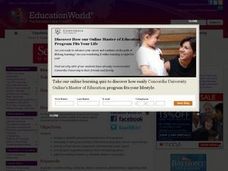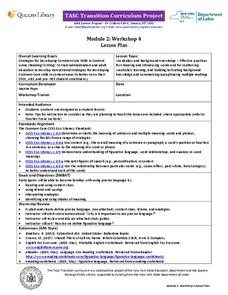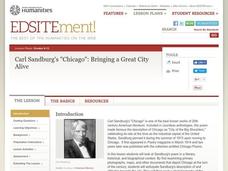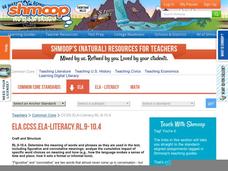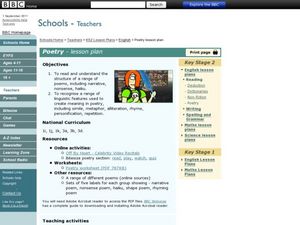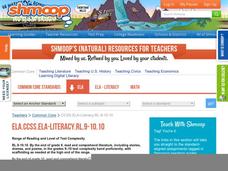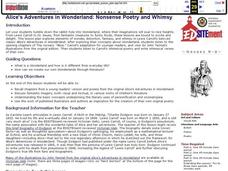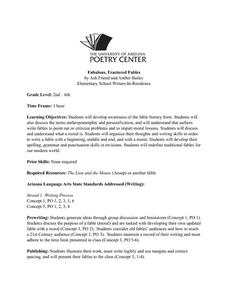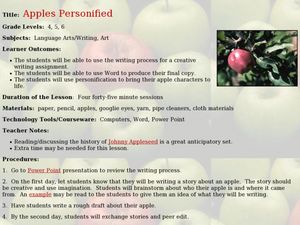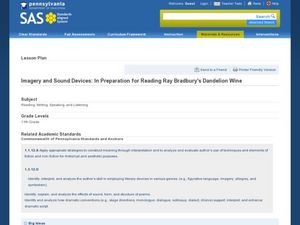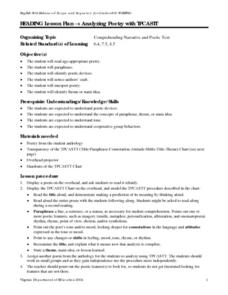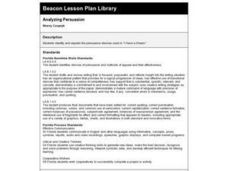Curated OER
Beanie Baby Biographies
Learners write a biography for their favorite Beanie Babies and then share their biography out loud. A simple, yet effective idea! Everyone loves their Beanie Baby!
Curated OER
Figurative Language 2
Students read nursery rhymes and advertisements to identify examples of figurative language. As a class, students discuss the use of figurative language and its effectiveness in advertising, children's books, rhymes, poetry, etc. ...
Curated OER
Teaching "A Week in the Woods"
The book, A Week in the Woods is the focus of the very interesting language arts lesson plan presented here. After the book has been read, learners engage in study of certain parts of the book in order to gain a better understanding of...
New York State Education Department
TASC Transition Curriculum: Workshop 4
Why is it important to use precise language? Participants explore this question in the fourth activity in a series of 15 on effective instruction. Perfect for all content areas, the activity promotes appropriate language choice through...
Curated OER
Carl Sandburg's "Chicago": Bringing a Great City Alive
Carl Sandburg composed poetry that conveyed a time and place in American Literature and history. Learners identify the literary techniques he uses to describe the historical and cultural context of living in Chicago. They define the...
Shmoop
ELA.CCSS.ELA-Literacy.RL.9-10.4
The fourth standard for reading literature in the Common Core calls for young readers to be able to determine the figurative and connotative meanings of words and phrases. Use this resource, a continuation of a series of Common Core...
Curated OER
Pictures in Words: Poems of Tennyson and Noyes
Learners examine how Tennyson and Noyes use words to paint vivid pictures. They read and analyze two poems, complete an online scavenger hunt, complete a worksheet, and write examples of alliteration, personification, metaphor, simile,...
Curated OER
The Coin and the Fable: Alaska quarter reverse
An Alaskan quarter and a book of fables is what you'll need to start this lesson. Learners will use the image of the bear and the salmon found on the reverse side of the Alaskan quarter as inspiration. They will compose a fable about the...
Curated OER
Different Types of Poetry
Provide pupils samples of different types of poems including haikus, narrative, nonsense, shape, and rhyming poems. In groups, class members read the poems, establish their general meaning, identify poetic devices, and rate the poems,...
Shmoop
ELA.CCSS.ELA-Literacy.RL.9-10.10
How do you assess what your pupils have learned over the course of the year? Find out how competent they are at reading and analyzing age-level literature with the ideas presented here. Included in this resource are two suggested...
Curated OER
Alice's Adventures in Wonderland: Nonsense Poetry and Whimsy
Primary learners are introduced to Lewis Carroll's whimsical poetry. They read "The Nursery Alice" Carroll's adaptation for younger readers, view story illustrations, listen to poetry and write whimsical verses of their own about food.
Curated OER
Fabulous, Fractured Fables
Elementary schoolers develop an awareness of the literary form known as the fable. They explore how authors write fables to pass along moral lessons. After reading and discussing many famous fables embedded in the plan, learners attempt...
Curated OER
Apples Personified
Students write a creative writing piece by personifying apples. In this creative writing lesson plan, students view a PowerPoint about the writing process and brainstorm about apples. Students write a rough draft about their apple and...
Curated OER
Imagery and Sound Devices: In Preparation for Reading Ray Bradbury's Dandelion Wine
Twelfth graders analyze Ray Bradbury's use of techniques and elements of fiction as well as nonfiction in the novel Dandelion Wine. In this novel analysis lesson, 12th graders analyze the sensory techniques in Dandelion Wine. Students...
Curated OER
Identifying Figurative Language
Students explore Fahrenheit 451 by Ray Bradbury. In this figurative language lesson, students locate similes, metaphors, and examples of personification in their reading. Students write down the page numbers of each example for future...
Curated OER
Read Aloud Lesson Plan
Students listen as the novel "On My Honor" is read to them. They identify similes and the characters differences in the novel.
Curated OER
Review of Literary Devices
Sixth graders review literary devices. They use both fiction and nonfiction texts to review metaphor, simile, alliteration, imagery, symbolism and personification. This lesson has a scripted guide for the teacher to follow.
Curated OER
Sonnets
Explore the concept of rhyme scheme within a Shakespearean sonnet. After writing out their favorite (appropriate!) rap song and explaining why they like it, middle schoolers define a rhyme scheme. Afterward, they examine a Shakespearean...
Curated OER
Analyzing Poetry with TPCASTT
Middle schoolers read a poem and complete a TPCASTT chart. They make a prediction about the title (T) , paraphrase each line (P), identify poetic devices and nuances (C-connotation), explore mood and tone (A-attitude), point out shifts...
Curated OER
Literary Analysis of The Minister's Black Veil
After reading The Minister's Black Veil, by Nathaniel Hawthorne as a homework assignment your class will complete a literary analysis. Learners will analyze important element of the story and take notes to help support their essays....
Curated OER
It's Raining Cats and Dogs! Literary Devices and Figurative Language
Third and fourth graders study literary devices and figurative language. They view a PowerPoint presentation (which you must create) to review hyperbole, idiom, simile, and metaphor. They read and discuss the book There's A Frog in My...
Curated OER
Expressing Our Thoughts Through Poetry
Students create a poem on about spring. They read final version of their poem chorally. They write reflections of their experience in creating the poem.
Curated OER
Style and Voice
Develop the writing skills of your high school class. Writers consider their personal style and voice, read selections by other authors, and then write pieces that challenge them to experiment with their own style.
Curated OER
Analyzing Persuasion
A reading of Dr. Martin Luther King Jr.'s "I Have a Dream" speech launches a study of rhetorical devices such as hyperbole, allusion, metaphor, simile, personification, connotative language and parallel structure. Class members then...


